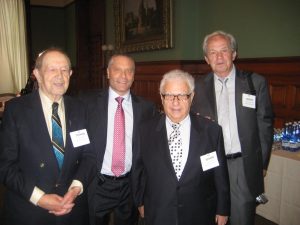Two Dutch couples posthumously joined the ranks of the Righteous Among the Nations, the highest honour that the State of Israel bestows to non-Jews for risking their lives to save Jews during the Holocaust.
The couples, Eimericus and Anna Maria Tijssen (Gielen) and Hendrik Willem and Frederika Jantina Veldboom (van Dijk) both hid Jewish people who survived the Holocaust. Both families moved to Canada shortly after the war, and representatives from both families were presented a medal and certificate from Yad Vashem in a ceremony at the Consulate General of Israel in Toronto, on June 26.
“Tonight, we honour four people who never expected medals. Who immigrated to Canada and worked humble jobs in a canning factory, doing maintenance” Idit Shamir, Israeli consul general in Toronto and Western Canada said in a speech at the beginning of the ceremony, in front of an audience that included many descendants from both families.
“Ordinary lives that touched eternity. They prove that you don’t need power to be powerful. You don’t need wealth to be rich. You don’t need fame to be immortal.”
During the ceremony, Shamir and Shael Rosenbaum, national chair of the Canadian Society for Yad Vashem, presented the Righteous Among the Nations certificate and medal to Elizabeth Quinlan, granddaughter of Eimericus and Anna Maria Tijssen, and Jantina Veldboom Devries, daughter of Hendrik and Frederika Veldboom.
The Tijssens
Eimericus and Anna Maria Tijssen hid Annika Muller at their home in Neerkant, Netherlands, despite having seven children and a grandchild of their own. Muller was born in 1941, shortly before the Nazis occupied the Netherlands.
In 1942, she was separated from her parents and passed from home to home by the Dutch resistance, until she ended up at the Tijssen household in 1943. She would remain there until the end of the war, when she was reunited with her family.
During the ceremony, a video message played from Muller, now 84 and unable to travel to Toronto. She grew up to be an artist, and always remembered her time spent in the Tijssen home.
“I am grateful for them, for having them in my early years,” she said. “There is much to say and tell. And I did that with painting my life. It’s a tribute for the people who saved me.”
Quinlan, the representative for the Tijssens, also spoke at the ceremony. For her grandparents and their children, saving Muller was not exceptional, even though they risked their lives to do it, she said. It was just the right thing to do, and so they did it.
“But it isn’t something that just anyone would have done. It was dangerous. It was an act of heroism that until now was unrecognized. And now that the story of our grandparents’ remarkable courage is being celebrated, we can all feel proud of what they have done,” Quinlan said.
“Saving one is saving many. The courage they showed is the type of courage that multiplies. Other people see that such courage is possible and feel empowered to act. For what our grandparents did, the humanity, compassion, empathy, courage and selflessness that they showed, we are all very proud.”
The Veldbooms
Hendrik and Frederika Veldboom hid five people at their farmhouse in the Netherlands near the German border. Among them were Lena Kropveld and her husband, Cantor Yitzchak Jedwab.
Kropveld and Jedwab married in secret in 1942, and by 1943, they were hiding in a secret space behind a closet in the Veldboom’s home. Kropveld became pregnant and gave birth to a son in hiding but had to give him up after holding him for only one hour. He was raised with the family of the leader of the Dutch resistance and reunited with his parents after the war, at which point he was circumcised.
Veldboom Devries, daughter of Hendrik and Frederika, said the story of Kropveld and Jedwab is well-known, even appearing in many Holocaust museums, but in all the retellings their saviours were anonymous. That motivated her to get recognition for her parents by applying to Yad Vashem to have them awarded with the Righteous Among the Nations designation.
“Finally, they have the recognition that they deserve. Now they wouldn’t say that themselves, but as a daughter, I think that they deserve it… it means a lot to me,” she said in her speech after receiving the medal and certificate on behalf of her parents.
“The medal, I looked it up, says, ‘Whoever saves one life, it is as if he saved an entire universe.’ And my parents didn’t save only one life, but five lives. And I am terribly proud of them that they didn’t think about themselves, but they first of all thought about other people and what they could do for them.”
Her parents would have been surprised to be honoured for the actions they took to save people during the war, Veldboom Devries said.
“It would be almost unthinkable for them because they don’t see themselves as being heroic just because they hid Jews during World War Two. They did the right thing at the right time,” she said.
“They were a modest, humble couple. They never drew attention to themselves… they were an ordinary couple, but together, they accomplished extraordinary things.”







